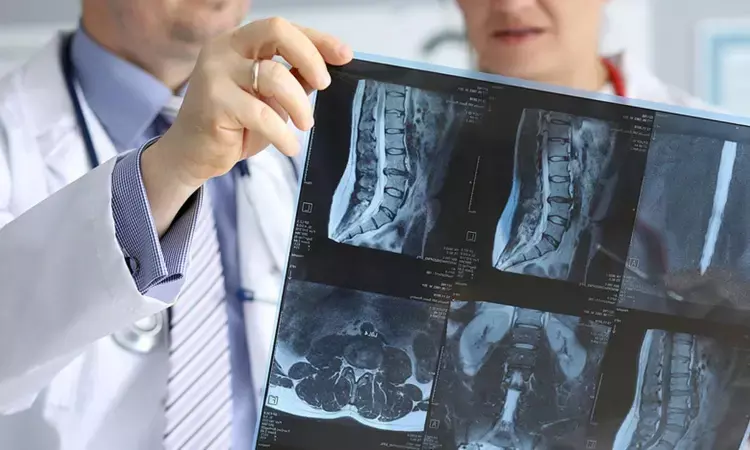- Home
- Medical news & Guidelines
- Anesthesiology
- Cardiology and CTVS
- Critical Care
- Dentistry
- Dermatology
- Diabetes and Endocrinology
- ENT
- Gastroenterology
- Medicine
- Nephrology
- Neurology
- Obstretics-Gynaecology
- Oncology
- Ophthalmology
- Orthopaedics
- Pediatrics-Neonatology
- Psychiatry
- Pulmonology
- Radiology
- Surgery
- Urology
- Laboratory Medicine
- Diet
- Nursing
- Paramedical
- Physiotherapy
- Health news
- Fact Check
- Bone Health Fact Check
- Brain Health Fact Check
- Cancer Related Fact Check
- Child Care Fact Check
- Dental and oral health fact check
- Diabetes and metabolic health fact check
- Diet and Nutrition Fact Check
- Eye and ENT Care Fact Check
- Fitness fact check
- Gut health fact check
- Heart health fact check
- Kidney health fact check
- Medical education fact check
- Men's health fact check
- Respiratory fact check
- Skin and hair care fact check
- Vaccine and Immunization fact check
- Women's health fact check
- AYUSH
- State News
- Andaman and Nicobar Islands
- Andhra Pradesh
- Arunachal Pradesh
- Assam
- Bihar
- Chandigarh
- Chattisgarh
- Dadra and Nagar Haveli
- Daman and Diu
- Delhi
- Goa
- Gujarat
- Haryana
- Himachal Pradesh
- Jammu & Kashmir
- Jharkhand
- Karnataka
- Kerala
- Ladakh
- Lakshadweep
- Madhya Pradesh
- Maharashtra
- Manipur
- Meghalaya
- Mizoram
- Nagaland
- Odisha
- Puducherry
- Punjab
- Rajasthan
- Sikkim
- Tamil Nadu
- Telangana
- Tripura
- Uttar Pradesh
- Uttrakhand
- West Bengal
- Medical Education
- Industry
Diabetes Linked to Higher Complications in Lumbar Spinal Fusion: Study Highlights Structural Changes in Bone Formation

USA: A recent study has shed new light on the challenges faced by individuals with diabetes undergoing lumbar spinal fusion surgery, revealing a heightened risk of complications linked to structural alterations in bone formation at the fusion site. Published in JBMR Plus, the research underscores the critical implications of diabetes on post-operative outcomes in spinal surgery.
The study found that lumbar spinal fusion procedures are far more likely to fail in individuals with diabetes. Lumbar spinal fusion is a common procedure aimed at stabilizing the spine and alleviating pain by fusing two or more vertebrae.
"Patients undergoing spinal fusion procedures are at a three times higher risk of developing non-union complications if they have diabetes compared to those without diabetes," the researchers reported, noting that surgical outcomes could be improved by controlling blood glucose levels before surgery and exploring therapeutic agents to support new bone formation.
Diabetes predisposes to spine degenerative diseases requiring surgery. However, the statistics on the prevalence of spinal fusion success and clinical indications leading to revision surgery in diabetes are conflicting. Considering this, Claire Wilson, University of Toledo, Toledo, OH, United States, and colleagues aimed to determine the link between diabetes and lumbar spinal fusion complications using a database of patients (n = 552, 45% male, age 54 ± 13.7 years) residing in the same community and receiving care at the same health care facility in a retrospective observational study.
Outcome measures were clinical indications and calculated risk ratio (RR) for revision surgery in diabetes. The research team analyzed paravertebral tissue recovered from a non-union site of nondiabetic and diabetic patients for the microstructure of newly formed bone.
The study led to the following findings:
- Diabetes increased the RR for revision surgery due to non-union complications (2.80) and degenerative processes in adjacent spine segments (2.26).
- In diabetes, the risk of revision surgery exceeded the RR for primary spinal fusion surgery by 44% (2.36 versus 1.64), which was already 2-fold higher than diabetes prevalence in the studied community.
- Micro-CT of bony fragments found in the paravertebral tissue harvested during revision surgery revealed structural differences suggesting that newly formed bone in diabetic patients may be of compromised quality than in nondiabetic patients.
The findings showed that diabetes significantly raises the risk of unsuccessful lumbar spine fusion outcomes needing revision surgery. Diabetes predisposes to the degeneration of adjacent spine segments and pseudoarthrosis at the fusion sites and impacts the structure of newly formed bone needed to stabilize fusion.
Reference:
Wilson, C., Czernik, P. J., Elgafy, H., Khuder, S., Serdahely, K., & Rowland, A. (2024). Diabetes increases risk of lumbar spinal fusion complications: Association with altered structure of newly formed bone at the fusion site. JBMR Plus, 8(6). https://doi.org/10.1093/jbmrpl/ziae053
Dr Kamal Kant Kohli-MBBS, DTCD- a chest specialist with more than 30 years of practice and a flair for writing clinical articles, Dr Kamal Kant Kohli joined Medical Dialogues as a Chief Editor of Medical News. Besides writing articles, as an editor, he proofreads and verifies all the medical content published on Medical Dialogues including those coming from journals, studies,medical conferences,guidelines etc. Email: drkohli@medicaldialogues.in. Contact no. 011-43720751


